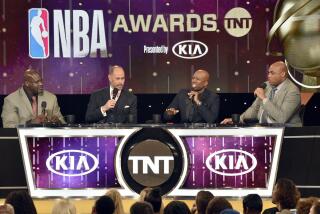Ted Turner’s TNT Exploding Onto the Cable Scene : Television: Network for classic movie buffs expands horizons with its own productions and added emphasis on sports.
- Share via
NEW YORK — It was the big bash for the launching of TNT, Ted Turner’s cable channel forclassic-movie buffs. Standing onstage at the Trump Plaza hotel in Atlantic City, N.J., Turner ceremonially threw the switch on TNT.
The first film to be shown on the new network was a movie that the Atlanta entrepreneur had loved for years: “Gone With the Wind.” As Clark Gable and Vivien Leigh appeared on a large video screen, Turner, according to an observer, looked up and quietly said to nobody in particular, “Well, it cost me a billion dollars, but it’s worth it.”
At one time, Turner was virtually alone in that assessment. When the creator of Cable News Network went to Hollywood in 1986 and paid more than $1 billion for the rights to “Gone With the Wind” and the other 3,300 titles in the MGM film library as part of his $1.5-billion purchase of the MGM/UA Entertainment Co., financial analysts said that Turner had overpaid by a significant margin.
The MGM/UA deal so burdened Turner’s company, Turner Broadcasting System Inc., with debt that the lone gun who had taken on the Big Three networks was forced to take in Time Inc. and other major cable-system operators as corporate partners.
“Sure, I identified with Rhett Butler as a kid and wanted to own ‘Gone with the Wind,’ ” Turner said in a recent interview. “But what we needed was the bulk and quality of the MGM library. And it turned out to be a good deal for us.”
Born of heart or head or both, TNT has proved to be one of the most successful new channels in the crowded cable field. Launched on Oct. 3, 1988, TNT is now available to about 40 million cable TV subscribers across the country. An advertiser-supported, basic-cable channel, TNT is offered to subscribers as part of the package of channels that comes with their monthly cable fee.
TNT is not on the list of the 10 largest cable networks, but it is one of the fastest-growing cable networks. It didn’t hurt that many of Turner’s cable partners gave TNT a base of subscribers to start with, but industry analysts say its growth is still a big hit at the cable box office.
“There was little doubt that TNT would be successful over time,” says Larry Gerbrandt, a cable analyst with Paul Kagan Associates. “What was surprising was that it was in the black by the end of its first year. What looked like an expensive deal ultimately turned out to be a smart move.” Gerbrandt places the current value of TNT at $700 million.
In addition to offering some 250 films a month, TNT recently has been expanding into making its own made-for cable TV-movies. The ratings are small by network standards, but not by cable’s, and they’re attracting some well-known actors. The TV-movies--now averaging about two a month but due to increase to four per month in 1991--range from a remake of “Dinner at Eight” with Lauren Bacall and Harry Hamlin to a biography of photographer Margaret Bourke-White starring Farrah Fawcett to an eight-hour adaptation of William L. Shirer’s “The Nightmare Years,” about the rise of the Third Reich, with Sam Waterston and Marthe Keller. Its most recent production, a new version of “Treasure Island” with Charlton Heston and Oliver Reed, premiered Monday night and repeats Saturday, Feb. 1 and 24.
The network also is going after Hollywood film makers interested in pursuing projects for TV. Steven Spielberg’s Amblin Entertainment company last month signed a deal to produce a series of teleplays by American playwrights for TNT. The dramas, which will be performed by a repertory company of actors, are expected to start airing in the spring of 1991.
And continuing a trend that may bring sorrow to sports fans who think it’s un-American for sports not to be on “free” broadcast TV, TNT also is joining other cable networks in buying the rights to major TV sports events. TNT is airing some 70 National Basketball Assn. games this winter.
In addition, in what was said to be the first sale of Olympics events to basic-cable TV, TNT has agreed to pay CBS Sports $50 million to air 50 hours of live events during the 1992 and 1994 Winter Olympics. TNT will carry several hours of events live during the day, with an overnight rebroadcast of the CBS prime-time coverage.
Although TNT executives say theatrical films will remain the mainstay of the network, the moves into other areas of programming are designed to differentiate the network and appeal to younger, upscale viewers in prime time.
“The good news/bad news about a ‘vertical’ cable channel like TNT is that people feel they can tune in any time to see movies,” said Scott Sassa, executive vice president. “We want to create events in prime time, including our best movies, that will compete with the broadcast networks.”
In addition to the MGM film library, which includes RKO Studios and pre-1950 Warner Bros. movies, Turner recently acquired the rights to 1,000 Columbia Pictures films, including such hits as “Tootsie,” for TNT and his superstation, TBS. The Warner library ranges from “Gone With the Wind” and “Casablanca” to such lesser-known films as “Dangerous Female,” a 1931 mystery billed as the first screen version of Dashiell Hammett’s novel “The Maltese Falcon.”
(Turner, with Time Warner and Denver-based Tele-Communications Inc., two of his most powerful shareholders, reportedly has been in on-again, off-again negotiations to add the United Artists film library to his collection through a bid for MGM/UA Communications Co. The sale is said to be off for now.)
Other cable channels and network TV stations offer old movies, of course. But in addition to the films in its library, TNT offers freshly minted prints--and clever repackaging.
“We struck all brand-new prints and tried to package them with a combination of reverence and fun,” said Gerry Hogan, president of TNT. The promotional materials aim for hip movie-lovers, and films on the network may be grouped by star, subject matter or even similar titles. One recent triple-feature: “He Couldn’t Say No,” “She Couldn’t Say No” and “She Had to Say Yes.”
Classics are there, but movie fiends who want to revel in a Lupe Velez festival or a “good trash” B picture can find what they’re after.
Ironically, while Turner has outraged many film makers with his colorization of classic American movies on TBS, TNT tends to plays its black-and-white films unadulterated.
“Colorization is an issue that people associate Ted with,” says Sassa. “But showing the original black-and-white versions seems more congruous with this channel.”
The reviews for TNT’s own made-for-TV movies have been generally positive. “Dinner at Eight” and “Man for All Seasons” were criticized as lesser, unnecessary remakes. But such recent TV-movies as “Cold Sassy Tree,” with Faye Dunaway, and the Holocaust drama “Max and Helen,” have been praised by some TV critics.
As TNT expands into sports and other areas, it may run the risk of alienating some of its core audience. Will there still be a happy ending for the audience that made TNT a surprise hit, the people in the dark (to quote Norma Desmond in “Sunset Boulevard”) who like their Bette Davis straight?
“Our primary identity is as a classic-movie channel,” Hogan said. “We won’t be walking away from that.”
More to Read
The biggest entertainment stories
Get our big stories about Hollywood, film, television, music, arts, culture and more right in your inbox as soon as they publish.
You may occasionally receive promotional content from the Los Angeles Times.










